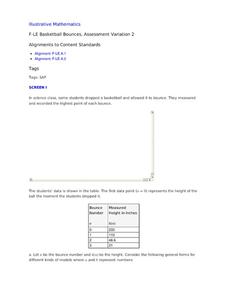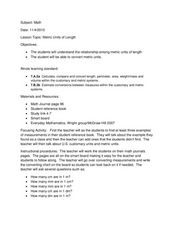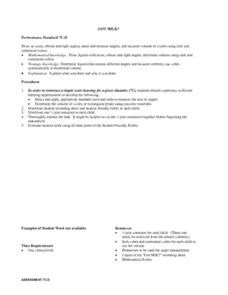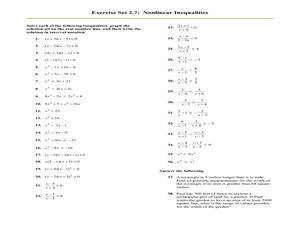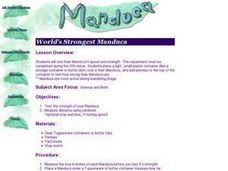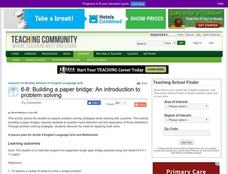Curated OER
Basketball Bounces, Assessment Variation 2
This un-scaffold summative assessment tasks learners to use the height of a bouncing basketball, given the data in graph and table form, to choose the model that is represented. Learners then use the model to answer questions about...
Curated OER
More Bait for Your Buck!
Students determine where to buy the heaviest earthworms as they study invertebrates. They create a double bar graph of the results of the weight data.
Curated OER
Scale Basketball
Students understand that a spreadsheet can be used to find the best scale to use in a model. They place the distances of the planets of the solar system to the Sun in one column of the spreadsheet. Students try different scales so that...
Curated OER
Metric Units Of Length
In this metric units of length worksheet, learners working with a partner problem solve and calculate the answers to twenty word problems and mathematical equations involving millimeters and kilometers.
Curated OER
Initial Fraction Ideas Lesson 17: Overview
Students use chips to represent units to show examples and non examples of fractions. In this fraction lesson plan, students show what chips can be used for different fraction scenarios.
Curated OER
House Dimensions
Fourth graders measure the perimeters of several different rooms. They convert the measurements using ratios that allow them to draw the rooms to scale on paper. They draw the dimensions of a house to scale. They measure length to the...
Curated OER
Got Milk?
Learners measure the angles of a milk carton. They identify and label acute, right, and obtuse angles. Using appropriate tools, students determine the volume of a cube or a rectangular prism. Learners complete worksheets to...
Curated OER
Plan a Cruise Lesson Plan
Students measure distances and report them in fractions, convert fractions to decimals, and multiply decimals.
Curated OER
The Circumference and Diameter of a Circle
Ninth graders investigate the finding of the diameter of a circle in order to extend the practice towards finding the circumference. They differentiate between the distance measured across a circle from that of around the perimeter.
Curated OER
Area
Young scholars solve problems involving area. In this geometry lesson, students calculate the area of an object and relate it to the area of the ocean. They define what exactly and area is and then solve problems relating to the real world.
Curated OER
Scaling Down Art
Students change the scale of a work of art using ratios, percentages, and proportions. While this is technically an art lesson, there is quite a bit of mathematics involved in converting to the correct scale.
Curated OER
Nonlinear Inequalities
In this Algebra II worksheet, 11th graders solve nonlinear inequalities, graph the solution set on the number line, and write the solution in interval notation. The one page worksheet contains thirty-eight problems. Answers...
Curated OER
Metric System
Students solve problems using the metric system. In this algebra lesson, students convert between the metric system and the Imperial system. They use these two systems to solve real life problems.
Curated OER
Patterns
Fourth graders investigate patterns and sequences. For this patterns and sequences lesson, 4th graders use a hundreds chart to build recurring patterns. Students skip count by threes and fives on a hundreds chart by coloring...
Curated OER
Area
Third graders find areas of rectangles by using square units, apply knowledge to real-life situations, and simplify method of counting square units by multiplying the length times the width.
Illustrative Mathematics
Floor Plan
A multi-step problem has learners finding the actual area based on a scale drawing and then converting units at the end. Two different solution choices are listed depending on the preference on which step to start first. Both methods can...
Curated OER
I Can Use a Worm to Count
Kindergarteners use worms, puppets or other props to practice counting to 100. First, they listen to a read aloud of Count Worms by Roger Hargeaves. A worm pattern is used to count to 100, with each segment of the worm...
Curated OER
I Wonder How Fast Manduca Grows Compared To Me
Students study the Manduca bug and its growth data. They look for patterns and compare their own growth rate to that of the Manduca.
Curated OER
Mean, Median, Mode, Range
Learners engage in a study of mean, median, mode, and range in order to represent data in tables. They are also exposed to the results of data that is skewed because of the outlier.
Curated OER
World's Strongest Manduca
Middle schoolers test the strength and speed of their Manduca. They keep their insect in a small dish and wiegh it down with pennies. They share their observations with the class.
Curated OER
Tick Around the Clock
Students examine and discuss the differences between clocks they are shown. Using the internet, they research how people used to tell time before clocks. They review what the long and short hand on the clock represent and practice...
Curated OER
Building a Paper Bridge: an Introduction To Problem Solving
Eighth graders explore problem solving strategies to build a paper bridge with a partner. As a class they discuss a variety of techniques to solve a simple problem, then in pairs construct the longest non-supported single span bridge...
Key Curriculum Press
Lesson 10.2 Volume of Prisms and Cylinders
Tenth graders investigate volume in class and in the real world. They explore volume of cylinders and prisms as it relates to different subjects. Pupils also investigate how important volume is in different career field.
Futures Channel
Folding Circles
Students investigate properties of circles. In this geometry lesson, students differentiate between similarity and congruence as they observe polygons. They investigate properties of two and three dimensional shape.
